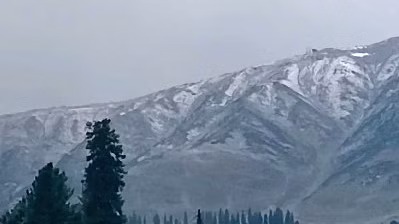Srinagar: The Gulmarg ski resort in north Kashmir’s Baramulla district received light snowfall on Sunday while rains lashed Kashmir plains in the evening, breaking a dry spell.
“There was a light snowfall in the upper reaches of Gulmarg last night,” MeT Director, Sonam Lotus told Media. “The ski resort also recorded an abrupt decrease in temperature.” He said that the maximum temperature at the ski resort on Sunday was 15 degrees Celsius, which is 3 degrees Celsius lower than Saturday.
Light rains lashed various parts of Kashmir late Sunday evening, bringing respite from the heat wave.
MeT officials here said that showers would continue for about 4 hours.
“Weather will be good from Monday morning,” they said, adding that there is no forecast of any heavy spell.
The Meteorological Department predicted a gradual decrease in temperature in the coming day.
Lotus said that there would be a gradual decrease in temperature across J&K with each passing day.
“There won’t be any abrupt decrease in temperature,” he said.
This summer Kashmir remained in the grip of an unprecedented heat wave, with dire consequences for its agriculture sector, particularly apple and paddy crops.
On September 12, Srinagar recorded its second-highest maximum temperature ever recorded in September since 1891, reaching a scorching 34.2 degrees Celsius, just shy of the all-time high of 35 degrees Celsius set in 1934.
Qazigund and Kokernag also experienced record-breaking temperatures, exacerbating an already challenging situation.
The soaring temperatures have led to the premature ripening of crops, disrupting their development cycle and adversely affecting both their quality and quantity.
The average September rainfall in Kashmir is 75 mm, but the region received only a mere 20 mm of precipitation, leaving a significant 55 mm deficiency.
Besides, Kashmir witnessed more than 80 percent deficient rainfall during some months, and the summer capital Srinagar recorded the lowest rainfall in 25 years in the month.
The MeT data shows that Srinagar witnessed just 9.2 mm of rainfall, recording a deficit of 86 percent.
The previous lowest rainfall in Srinagar was recorded in the year 1998 with 8.8 mm of precipitation, while the all-time low of 2.7 mm was recorded in 1987.



























